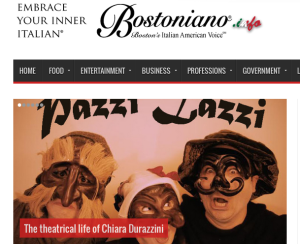 As Colombina, the servant of the rich and stingy Venetian merchant Pantalone, Chiara Durazzini is extremely convincing as she delivers on stage the blend of grace and cunning embodied by the most famous female figure of Commedia dell’Arte — the theatrical representation of human mores, vices and virtues invented in Italy in the 1500s. Yet all it takes for her to turn into a — just as convincing — bold and flamboyant Spanish Captain without even needing to get behind the scenes. (Nothing sexual about it, of course, at least in this case – even though double entendre and play on words are a fundamental element in this particular way to interpret the world’s most ancient performing art.) All it takes, also thanks to Durazzini’s slightly tomboy-ish, petite figure, is a gesture of the hand: the fluffy, baroque garment flies among the audience revealing a pair of red spandex pants and … voilà! Colombina becomes the roaring Captain …. Who, by the way, before the end of the sketch is bound to turn back again into the (only apparently) humble maid.
As Colombina, the servant of the rich and stingy Venetian merchant Pantalone, Chiara Durazzini is extremely convincing as she delivers on stage the blend of grace and cunning embodied by the most famous female figure of Commedia dell’Arte — the theatrical representation of human mores, vices and virtues invented in Italy in the 1500s. Yet all it takes for her to turn into a — just as convincing — bold and flamboyant Spanish Captain without even needing to get behind the scenes. (Nothing sexual about it, of course, at least in this case – even though double entendre and play on words are a fundamental element in this particular way to interpret the world’s most ancient performing art.) All it takes, also thanks to Durazzini’s slightly tomboy-ish, petite figure, is a gesture of the hand: the fluffy, baroque garment flies among the audience revealing a pair of red spandex pants and … voilà! Colombina becomes the roaring Captain …. Who, by the way, before the end of the sketch is bound to turn back again into the (only apparently) humble maid.
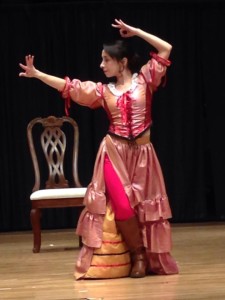 The performance in question, held at the North End library together with a lecture on the origins and development of Commedia dell’Arte as part of Italian Heritage Month in Massachusetts, is one of many she and Pazzi Lazzi — the self-producing, self-writing, self-sufficient, theater company founded and led by this forty-something professional actress from Florence — have on their calendar. In fact, for the small group of actors and musicians who in 2012 set out to adapt an Italian renaissance form of art to modern times, it has been a constant crescendo.
The performance in question, held at the North End library together with a lecture on the origins and development of Commedia dell’Arte as part of Italian Heritage Month in Massachusetts, is one of many she and Pazzi Lazzi — the self-producing, self-writing, self-sufficient, theater company founded and led by this forty-something professional actress from Florence — have on their calendar. In fact, for the small group of actors and musicians who in 2012 set out to adapt an Italian renaissance form of art to modern times, it has been a constant crescendo.
After starting locally, mostly called by universities with Italian programs and Italian cultural centers, the crew now includes Italian actor Emanuele Capoano, American actresses Maya Attia and Liz Adams and American musical jack-of-all-trades John Tyson. The group is in very high demand, with tours in New York, Vermont and Indiana already in their resume and preparing for even bigger and better venues, including a gig this coming winter at the Kennedy center in Washington D.C., invited by the Italian embassy as representatives of Italy at an international festival of theater for children.
“This is more than I ever hoped for – or should say I expected?” says Durazzini, who is just as witty and energetic in real life as she is during her performances.
“I started this because I wanted company… you know monologues get old after a while… and now look at us … the Kennedy Center! Can you believe it?” Yet, as amazed as Durazzini might sound, her “creature’s” success did not come out of the blue. By her own admission, her entire life has been a relentless pursuit of theatrical excellence: from early childhood, when she would put up shows for her parents in the house, to high school when she would sit on the teachers’ chair before they arrived and deliver their impression for her classmates’ amusement. “Once my art teacher caught me red handed,” she recalls. “’I saw you!’ she said. ‘But that was a good impression wasn’t it?’ was my answer. She didn’t really punish me so … she must have thought so too.”
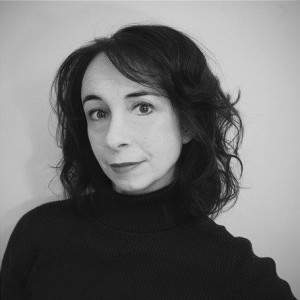 Her love for theater and performing soon took her away from her native Florence to Bologna, where she attended DAMS, the ‘artistic branch’ of the Western world’s oldest university. There, her life dramatically changed, although … only from a geographical standpoint: in Bologna she met an American boy, now her husband — “a doctor who has nothing to do with the theater but who, God bless him, takes me there (to the theater, that is) all the time,” whom in the year 2000 she followed across the Atlantic.
Her love for theater and performing soon took her away from her native Florence to Bologna, where she attended DAMS, the ‘artistic branch’ of the Western world’s oldest university. There, her life dramatically changed, although … only from a geographical standpoint: in Bologna she met an American boy, now her husband — “a doctor who has nothing to do with the theater but who, God bless him, takes me there (to the theater, that is) all the time,” whom in the year 2000 she followed across the Atlantic.
As far as being “in” the theater, however, her life did not change that much. Her insatiable hunger for the stage continued to drive her, at least in the beginning, in a direction that took her away from her native Italy. “At first I completely immersed myself in American life – and theatre,” she recalls while literally picking up the pieces – costumes, props, background panels and what not – from her lecture/performance at the library. “Due to my tiny size and my accent I would get all sorts of gigs with local theater companies, such as the Apollinaire one, and play the strangest roles, including the alien,” she continues, adding with a wink, “extraterrestrial, I mean, although illegal immigrant, which given my English pronunciation at the time would have worked just as well,” revealing a propensity to joke and play with words that constantly follows her off stage.
“For years, my only umbilical chord with the motherland – artistically speaking – were Northeastern University, and the Dante Alighieri Society, the only two venues who regularly, yet rarely – called me to perform monologues based on Commedia dell’Arte, a genre I always loved especially after studying it first at University, then through various workshops.”
Durazzini speaks uninterruptedly, keeping several trains of thought going at once, as we slalom through the Saturday lunchtime crowd (probably the thickest, all feasts aside) in the North End. She is shorter than her 11-year-old son, and her younger, 9, is bound to reach her very soon. Yet it is hard for them (and for me) to keep up, both with the walk and with the storytelling, as if the performance that just ended had only enhanced her level of energy.
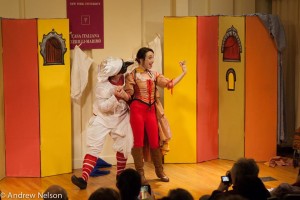 “But pretty soon, monologues got old: you see, Commedia dell’Arte is all about interaction,” she explains, pinpointing the essence of this 500-year-old Italian form of art that exactly through the comparison, often confrontational, between masked caricatures from different Italian regions highlighted the tics, the mores and most of all the vices of typical human types who, in fact, can be found anywhere, regardless of history or geography.
“But pretty soon, monologues got old: you see, Commedia dell’Arte is all about interaction,” she explains, pinpointing the essence of this 500-year-old Italian form of art that exactly through the comparison, often confrontational, between masked caricatures from different Italian regions highlighted the tics, the mores and most of all the vices of typical human types who, in fact, can be found anywhere, regardless of history or geography.
In fact, the greedy merchant from Venice Pantalone, the cunning servant from Bergamo Arlecchino, the know-it-all doctor from Bologna Balanzone, and the lazy hustler from Naples Pulcinella are perfectly applicable to 2015 Boston, or New York, as long as they speak English and a few modern elements are weaved into the sketches. And that is exactly what Chiara and her Pazzi Lazzi crew do so successfully, since she and Emanuele Capoano, a Calabria native who also lived in Florence for many years and, just like Durazzini, came to America as a “new immigrant.”
“Chemistry was instantaneous: and we have been going at it since then,” says Durazzini, with a sentence that seems borrowed from one of their sketches. “Sassy, sexual, double entendre is the salt of Commedia dell’Arte,” she explains, “however when we perform for children — and we often do — we have to clean up our act a bit. Especially here in America, you know what I mean! We don’t find the censored sketches as funny, but kids seem to enjoy them anyway, because it’s a very physical theater, with some mechanical humor, sometimes on the verge of acrobatics.”
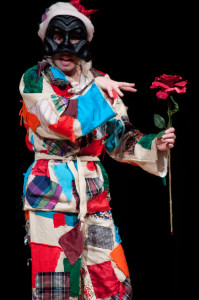 But it’s the grown up material they seem to like the best: 20- to 30-minute sketches spiced up with references to current events – in English more often than not, even though their Italian production is expanding due to the growing demand from colleges and cultural centers. “We take our ideas from all kinds of sources, including ‘letters to the editor’ in newspapers and magazines and we splice in just about anything – from Rap music to Donald Trump, as long as it works,” says Durazzini.
But it’s the grown up material they seem to like the best: 20- to 30-minute sketches spiced up with references to current events – in English more often than not, even though their Italian production is expanding due to the growing demand from colleges and cultural centers. “We take our ideas from all kinds of sources, including ‘letters to the editor’ in newspapers and magazines and we splice in just about anything – from Rap music to Donald Trump, as long as it works,” says Durazzini.
And it has to work on themselves, first, at rehearsal, which still, by the way, happens in their own homes. “We try new scenes and new jokes all the time. If we don’t laugh, chances are people won’t either. You see, from personal experience,” she concludes, “I know audiences have fun when performers do, and so far, believe me, we have been having a blast!”
